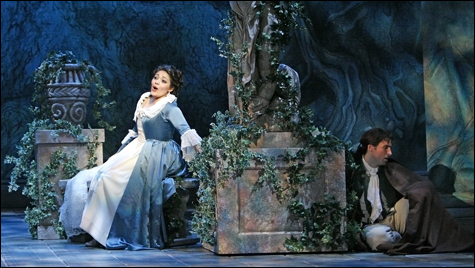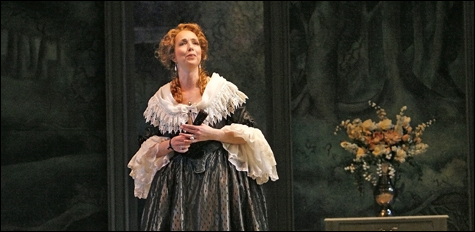Ailyn Pérez shines in BLO’s Figaro; so does Gabriela Montero with the Boston Philharmonic

TENDER DUALITY: Ailyn Pérez is a teasing Susanna in “Deh vieni non tardar.”
|
“I’ve just come from The Marriage of Figaro,” a character says in one of the best jokes from a Boston Lyric Opera production. “It’s longer than Parsifal and not nearly as funny.” Not a problem in the BLO’s latest production of Mozart’s most humane comedy. Music director Stephen Lord conducts a Figaro that clocks in close to three and a half hours (though with two big arias cut from the last act, it’s not as long as it could be) but is easily funnier than Wagner’s religious allegory, and so engaging, few people will be checking their watches. Lord is one of the heroes of this company, and he’ll be missed when, after next season, he goes on to bigger and better venues like the San Francisco and Chicago Lyric Operas. From the opening bars of the famously fizzy overture, he catches not just its speed but its mysterious combination of liberation and tension, the perfect preparation for an evening of elaborately woven machinations, hilarious confusions, and sublime melody. This is one of the best musical performances in the BLO’s checkered history. (Figaro continues at the Shubert Theatre through May 8.)
Lord has assembled one of BLO’s best-ever casts. The eight major roles are all superbly (in a couple of cases spectacularly) sung, mostly by singers new to Boston. And they sing especially well together. As Susanna, the spunky maid to Countess Almaviva and adoring fiancée of Figaro, valet (and former barber) to Seville’s Count Almaviva, 27-year-old soprano Ailyn Pérez (Chicago-born, to parents from Mexico) is adorable in looks and personality, always instantly responsive to what’s going on around her, a sparkling, vivacious comedienne who can also touch your heart. And her voice — dewy, pearly, prismatic, glowing, over a wide dynamic range — makes you eager to hear each new phrase. The emotional center of this Figaro is her last-act aria, “Deh vieni non tardar” (“Beloved, don’t delay”), in which Susanna, knowing that her beloved but jealous Figaro is watching her, pretends to be awaiting a lover, which, of course, she is — Figaro! Pérez catches the tender duality of Susanna’s serenade, and her exquisite pianissimos add another dimension to her already iridescent full voice.
Commanding Brazilian baritone Paulo Szot makes the lecherous Count (a role he’s sung with New York City Opera; he’s also been a Met Don Giovanni) both amusing and even sympathetic without diminishing his threat. Although he claims to have given up his ancient feudal right to bed any servant-class bride before her husband does, the Count still wants to take advantage of Susanna on her wedding night — he doesn’t get the new morality. But by the end of the opera, he does, and as a result of Szot’s pointed phrasing (especially in his big paranoid aria), his penitent plea for forgiveness finally rings true. In the “trouser” role of the Count’s oversexed young page, Cherubino (“little cherub”), mezzo-soprano Kate Lindsey is a very convincing boy in Susan Benson’s elegantly fitting costume, and the burnished, almost coppery timbre of her voice fits too.
Some Boston singers also stand out. It’s a treat to see glamorous mezzo Gale Fuller in a comic character role, the housekeeper Marcellina, who wants to marry Figaro but turns out to be his mother. She gives a gem of a performance and is in unusually sumptuous voice for this role. Another admirable Bostonian, tenor Frank Kelley, is an irresistibly slimy, pasty-faced Don Basilio, the smarmy, manipulative music master. No one has ever done more with this role than Kelley in the memorable Peter Sellars/Craig Smith version set in the Trump Tower. It’s a shame that with such performers both Basilio’s unsettlingly self-knowing aria and Marcellina’s big aria are cut from the last act. Could company management be watching the clock to avoid overtime even if the audience isn’t?

DOVE SONO? Jennifer Casey Cabot’s Countess sings beautifully, but some poignance is missing.
|
As Bartolo, Marcellina’s conspirator/consort, the fine bass Matthew Lau is deftly, slyly amusing. Bass-baritone Michael Callas gives his best BLO performance as the drunken gardener Antonio. As his daughter Barbarina, though, the excellent young soprano Allison Pohl, still in the BU master’s program, rather oversings this enchanting role. Tenor Brent Matthew Wilson finds a better balance between comedy and good singing as the stuttering magistrate, Don Curzio.
I have both admiration and a few reservations about the singers in the two other major roles, the Countess and the title character. Soprano Jennifer Casey Cabot returns to BLO after previously singing two ferociously difficult Mozart parts: the heroic Konstanze in Die Entführung aus dem Serail and the mock-heroic Fiordiligi in Cosí fan tutte. She has a silvery voice that soars effortlessly up the scale. Without benefit of warm-up, most sopranos have a hard time with the Countess’s opening aria, “Porgi amor,” then work themselves up to her later, and greater, “Dove sono,” her lament for a happier past. Vocally, Cabot nails both of these. But in “Dove sono,” in which the repeat section, often sung pianissimo, can be one of the most poignant moments in all of Mozart, Cabot simply repeats it, adding a rather mechanical last-minute embellishment. She’s a good singer, but on opening night, she seemed to lack the highest level of musical insight or imagination. (Pérez has sung this part too — I’d love to hear her.)